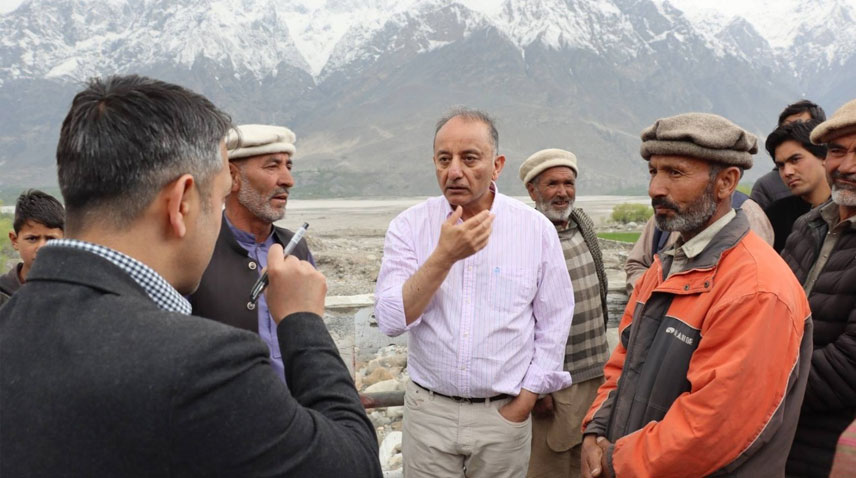Gilgit: Federal Minister for Climate Change, Senator Musadik Malik, has emphasized that Gilgit-Baltistan (GB) is at the forefront of climate change, facing increasing incidents of glacial melting and Glacial Lake Outburst Floods (GLOFs), which have caused widespread destruction over the years.
Senator Malik, accompanied by a high-level delegation from the UNDP and the Ministry of Climate Change, is currently in Baltistan to assess the impacts of climate change and review initiatives under the GLOF-II Project.
The delegation visited Ghanche district on Wednesday, following an earlier visit to Shigar district.
During their visits, they reviewed climate adaptation measures implemented under the GLOF-II Project, such as the installation of early warning systems, flood protection barriers, water channels, and community centers.
The federal minister also examined the damage caused by glacial melting and GLOFs, which continue to threaten local populations.
In Barah village, located in Ghanche district, Senator Malik inaugurated a community center built under the GLOF-II Project.
He also evaluated ongoing efforts focused on empowering women and enhancing community resilience to climate impacts.
“The initiatives under the GLOF-II Project are vital and deserve recognition for enabling communities to respond effectively to climate-related threats,” said Minister Malik.
“These efforts are essential in building a more resilient Pakistan.”
Development in Gilgit
Gilgit-Baltistan (GB) has been experiencing significant development in recent years, particularly in the face of growing climate change challenges.
The region, known for its stunning landscapes and strategic importance, is highly vulnerable to climate-related issues, including glacial melting and Glacial Lake Outburst Floods (GLOFs).
To address these risks, the government has launched several climate adaptation initiatives, such as the GLOF-II Project, which aims to mitigate the impacts of these disasters and build resilience in local communities.
Read More: Gilgit-Baltistan Introduces Entry Fee for Tourist Vehicles and Motorcycles
Under the GLOF-II Project, critical infrastructure has been developed, including the installation of early warning systems, flood protection barriers, water channels, and community centers.
These interventions are designed to help communities better respond to climate threats, with a special focus on women’s empowerment and enhancing community resilience.
Additionally, the region has seen improvements in basic infrastructure, education, and healthcare, thanks to both federal and provincial government efforts.
There have been investments in roads, energy projects, and tourism development, which are expected to further boost the economy and improve the livelihoods of local populations.
Despite these advancements, GB continues to face challenges due to its geographic location and environmental vulnerabilities.
Also Read: Punjab Increases Scholarship Opportunities for Gilgit-Baltistan Youth
Continued support and sustainable development efforts are crucial to ensuring a resilient future for the region. Story by AHmed Mukhtar.









